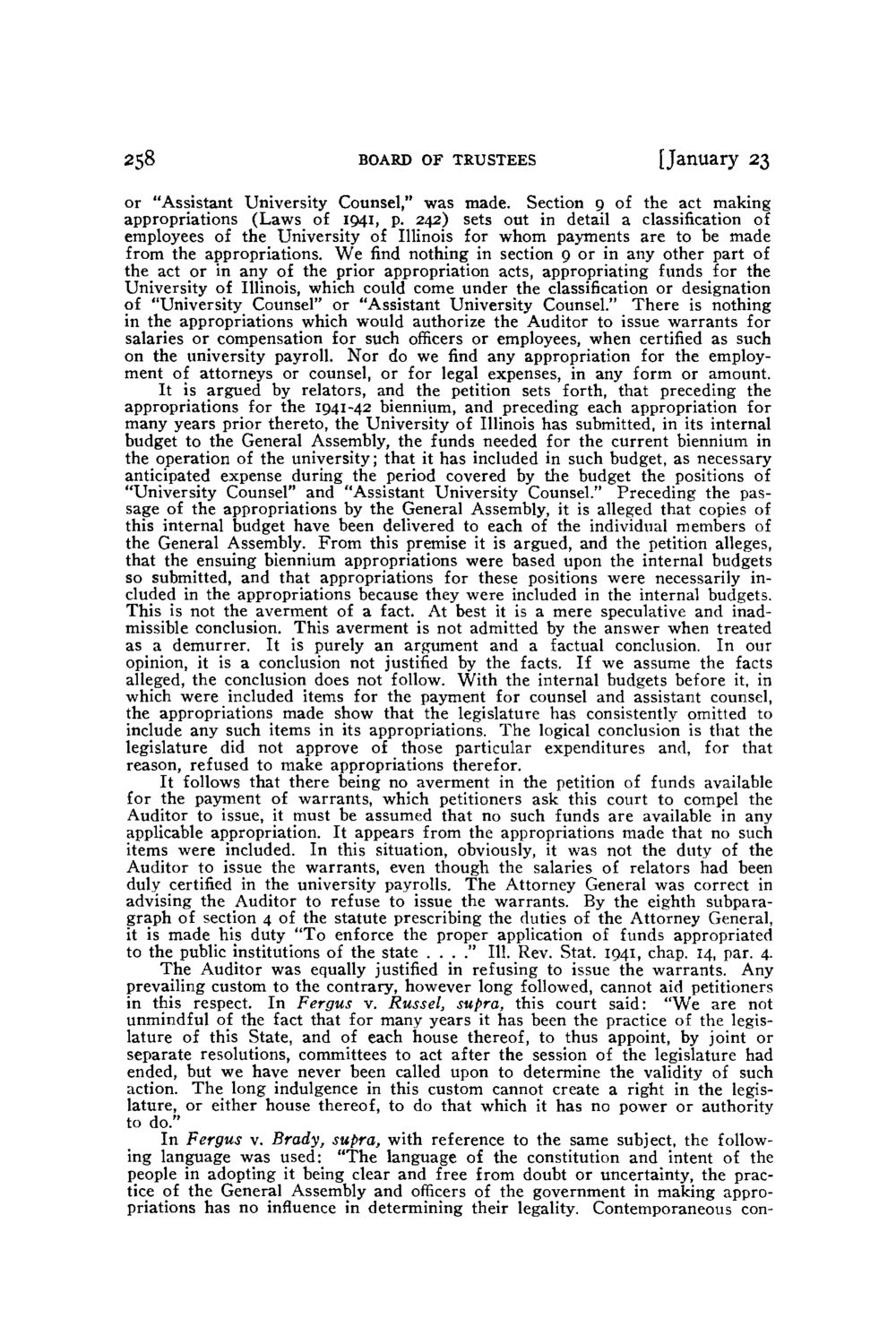| |
| |
Caption: Board of Trustees Minutes - 1944
This is a reduced-resolution page image for fast online browsing.

EXTRACTED TEXT FROM PAGE:
258 BOARD OF TRUSTEES [January 23 or "Assistant University Counsel," was made. Section 9 of the act making appropriations (Laws of 1941, p. 242) sets out in detail a classification of employees of the University of Illinois for whom payments are to be made from the appropriations. W e find nothing in section 9 or in any other part of the act or in any of the prior appropriation acts, appropriating funds for the University of Illinois, which could come under the classification or designation of "University Counsel" or "Assistant University Counsel." T h e r e is nothing in the appropriations which would authorize the Auditor to issue warrants for salaries or compensation for such officers or employees, when certified as such on the university payroll. Nor do we find any appropriation for the employment of attorneys or counsel, or for legal expenses, in any form or amount. It is argued by relators, and the petition sets forth, that preceding the appropriations for the 1941-42 biennium, and preceding each appropriation for many years prior thereto, the University of Illinois has submitted, in its internal budget to the General Assembly, the funds needed for the current biennium in the operation of the university; that it has included in such budget, as necessary anticipated expense during the period covered by the budget the positions of "University Counsel" and "Assistant University Counsel." Preceding the passage of the appropriations by the General Assembly, it is alleged that copies of this internal budget have been delivered to each of the individual members of the General Assembly. F r o m this premise it is argued, and the petition alleges, that the ensuing biennium appropriations were based upon the internal budgets so submitted, and that appropriations for these positions were necessarily included in the appropriations because they were included in the internal budgets. This is not the averment of a fact. At best it is a mere speculative and inadmissible conclusion. This averment is not admitted by the answer when treated as a demurrer. It is purely an argument and a factual conclusion. In our opinion, it is a conclusion not justified by the facts. If we assume the facts alleged, the conclusion does not follow. W i t h the internal budgets before it, in which were included items for the payment for counsel and assistant counsel, the appropriations made show that the legislature has consistently omitted to include any such items in its appropriations. T h e logical conclusion is that the legislature did not approve of those particular expenditures and, for that reason, refused to make appropriations therefor. It follows that there being no averment in the petition of funds available for the payment of warrants, which petitioners ask this court to compel the Auditor to issue, it must be assumed that no such funds are available in any applicable appropriation. It appears from the appropriations made that no such items were included. In this situation, obviously, it was not the duty of the Auditor to issue the warrants, even though the salaries of relators had been duly certified in the university payrolls. The Attorney General was correct in advising the Auditor to refuse to issue the warrants. By the eighth subparagraph of section 4 of the statute prescribing the duties of the Attorney General, it is made his duty " T o enforce the proper application of funds appropriated to the public institutions of the state . . . ." 111. Rev. Stat. 1941, chap. 14, par. 4. T h e Auditor was equally justified in refusing to issue the warrants. Any prevailing custom to the contrary, however long followed, cannot aid petitioners in this respect. In Fergus v. Russel, supra, this court said: " W e are not unmindful of the fact that for many years it has been the practice of the legislature of this State, and of each house thereof, to thus appoint, by joint or separate resolutions, committees to act after the session of the legislature had ended, but we have never been called upon to determine the validity of such action. T h e long indulgence in this custom cannot create a right in the legislature, or either house thereof, to do that which it has no power or authority to do." In Fergus v. Brady, supra, with reference to the same subject, the following language was used: " T h e language of the constitution and intent of the people in adopting it being clear and free from doubt or uncertainty, the practice of the General Assembly and officers of the government in making appropriations has no influence in determining their legality. Contemporaneous con-
| |